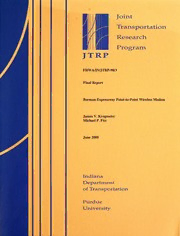Table Of ContentJoint
Transportation
Research
Program
JTRP
FHWA/IN/JTRP-98/3
FinalReport
BormanExpresswayPoint-to-PointWirelessModem
JamesV.Krogmeier
MichaelP.Fitz
June2000
Indiana
Department
of Transportation
Purdue
University
FinalReport
FHWA/IN/JTRP-98/03
Borman Expressway Point-to-Point
Modem
Wireless
By
J. V. Krogmeier
SchoolofElectricalandComputerEngineering
PurdueUniversity
JointTransportationResearchProgram
ProjectNo.C-36-75H
FileNo. 8-9-8
SPR-2036
InCooperationwiththe
IndianaDepartmentofTransportation
andthe
U.S. DepartmentofTransportation
FederalHighwayAdministration
The contents ofthis reportreflectthe views ofthe authors who are responsible forthe facts and
the accuracy ofthe data represented herein. The contents do not necessarily reflect the official
views or policies of the Federal Highway Administration and the Indiana Department of
Transportation.Thereportdoesnotconstituteastandard,specificationorregulation.
PurdueUniversity
WestLafayette,Indiana47907
June2000
Digitized by the Internet Archive
in 2011 with funding from
LYRASIS members and Sloan Foundation; Indiana Department of Transportation
http://www.archive.org/details/bormanexpressway9803krog
TECHNICALREPORTSTANDARDTITLEPAGE
1. ReportNo. 2.GovernmentAccessionNo. 3.Recipient'sCatalogNo.
FHWAyLN/JTRP-98/13
4.TitleandSubtitle 5. ReportDate
June2000
BormanExpresswayPoint-to-PointWirelessModem
6. PerformingOrganizationCode
7.Authors) 8. PerformingOrganization ReportNo.
JamesV.KrogmeierandMichaelP.Fitz
FHWA/IN/JTRP-98/3
9.PerformingOrganizationNameandAddress 10.WorkUnitNo.
JointTransportationResearchProgram
1284CivilEngineeringBuilding
PurdueUniversity
WestLafavette.Indiana 47907-1284
11. ContractorGrantNo.
SPR-2036
12.SponsoringAgencyNameandAddress 13.TypeofReportandPeriodCovered
IndianaDepartmentofTransportation
StateOfficeBuilding FinalReport
100NorthSenateAvenue
Indianapolis,IN46204
14.SponsoringAgencyCode
15.SupplementaryNotes
PreparedincooperationwiththeIndianaDepartmentofTransportationandFederalHighwayAdministration.
16.Abstract
TheFederalHighwayAdministrationhasanationwideallocationoffivefrequencypairsinthe220-222MHzNarrowbandRadioServices
bandwhichareintendedforapplicationinIntelligentTransportationSystems.ThesefrequenciesareavailableforusebystateDOTs
(subjecttoFHWAapproval)andprovideanattractivesolutionforcertainlowtomediumbitratedatacommunicationsapplications.
However,giventhelimitedbandwidthavailableinthesechannels,veryefficientmodemswillberequiredtomakemaximumbeneficial
useofthisresource.
Thegoalofthisprojectwastodesign,fieldtest,anddeployadigitalradiowhichusesthe220-222MHzspectralallocationandissuitable
forstationarypoint-to-pointdatacommunicationsapplications.Thetargetapplicationforthisprojectwasthecontrol(pan,tilt,andzoom)
ofavideocameralocatedattheinterchangeof1-65andtheBormanExpressway.Thewirelesslinkextendsfromthecameralocationto
thetrafficoperationscenter(approximately 1.5miles).Therewerethreemaintasksneededtoproduceadeployablemodem: 1)interface
circuitrywasrequiredbetweenthe220MHzmodemandthecameracontrolkeypadandthecamerapan/tilt/zoomreceiver,2)the
fabricationofacompactandruggedtransmitterwasrequired,and3)thefabricationofacompactandruggedreceiverwasrequired.The
receiversizeconstraintsweremoreexactingthanthoseofthetransmitterasthereceiverisdeployedinaroadsidecabinet,whilethe
transmitterisdeployedinthetrafficmanagementcenter.Theworkplanwasdividedintoasetoftwelvetasks.
The220MHzmodemcanserveINDOTasageneralpurposelinkforlowtomediumratedatacommunicationsinawidevarietyof
applications.Themostsignificantissueoutstandingwithregardtowidespreadimplementationofthetechnologyisthemassproduction
costandtheavailabilityofareliablesourceofproductionversionsofthedevice.EffortsarecontinuingatbothPurdueandOhioState
towardfurthersimplificationsaimedatcomplexityreductioninthereceiver.Astopicsforfurtherstudy,thefollowingshouldbe
considered: 1)adetailedcost/benefitanalysisshouldbemadecomparingthe220MHztechnologytootheralternativetechnologies,and
2)apreliminarydesignstudyofinteroperabilityissuesshouldbeperformedforthe220MHztechnologyintransportationapplications.
17.KeyWords 18.DistributionStatement
wciarmeelreasscocnotmrmoul,nitcealteimoentrsy,dJaTtSa2tr2a0nsMmHiszsiaolnl.ocation,surveillance NNaotiroensatrlicTteicohnsn.icTahliIsndfoorcmuamteinotniSseravviaciel,ablSeprtiongtfhieelpdu,blVicAt2hr2o1u6g1hthe
19.SecurityClassif.(ofthisreport) 20.SecurityClassif.(ofthispage) 21.No.ofPages 22.Price
Unclassified Unclassified 22
FormDOTF1700.7(8-69)
1
Table ofContents
Abstract 5
1 Introduction 6
2 ProblemStatement 6
3 ObjectivesorPurpose 7
4 WorkPlan 7
5 AnalysisofData 9
5.1 DesignoftheInterfaceCircuitry 9
5.2 DesignofthePoint-to-PointModem 9
53 FieldTestingofthePoint-to-PointModem 1
5.4 IntegratedCircuitDevelopment 12
5.5 DeploymentandTestoftheBormanPoint-to-PointModem 13
6 Conclusions 75
7 Recommendations 16
8 ImplementationSuggestions 16
9 References 17
10 Appendices 19
AppendixA: TheDesignofthePoint-to-PointModem 19
A.l TrellisCodedModulation 19
A.1.1 Encoding 19
A.1.2 Decoding 21
A.1.3 ClosingtheTrellis 22
A.2 CarrierRecovery 22
A.2.1 TheDPLLoftheModem 23
A.2.2 TheLoopFilter 25
AppendixB: RealTimeImplementationofaSymbolTimingRecovery 27
B.l Introduction 27
B.2 TheSymbolTimingArchitecture 28
B.2.1 ThePrefilter 29
B.2.2 TheNonlinearity 29
B.2.3 ThePostfilter 29
B.2.4 TheSampler 30
B.3 ComplexityConsiderationsinDSPImplementation 30
B.3.1 HardwareDesign 30
B.3.2 ComplexityEstimation 31
B.3.3 ComplexityReduction 32
B.4 IllustrationofComplexity/PerformanceTradeoffs 33
AppendixC: Borman WirelessMODEMOperator'sManual 34
C.l Introduction 34
C.2 OverviewoftheModemSystem 35
C.2.1 InterfaceandProtocol 35
C.2.2 TransmitterUnit 35
C.2.3 ReceiverUnit 36
C.2.4 Accessories 36
C.3 EquipmentSetup 37
C.3.1 RadioTransmitter 37
C.3.2 RadioReceiver 38
C.4 Troubleshooting 38
C.4.1 NormalModeofOperation 38
C.4.2 TroubleshootingTips 39
C.5 Addenda 40
C.5.1 WiredTestModefortheKeypadandCameraController 40
List ofFigures
Figure1: Thevicinityof1-65andtheBormanExpresswayinterchange. Whitestarsindicatethelocationsofthe
TMCandthecamera. Thepoint-to-pointlinkofthisprojectislineofsightbetweenthetwostars 7
Figure2: Illustrationofmodemandcameracontrolinterface 9
Figure3: 220MHzModemBlockDiagrams, (a)Transmitter, (b)Receiver 10
Figure4: Receivedsignalconstellationsfromfieldtesting,(a)Receiverlocatedapproximately1.75milesfrom
transmitter,(b)Receiverlocatedapproximately2.5milesfromtransmitter 12
Figure5: AblockdiagramoftheITSmodemreceiverandtheproposedblockstobeincorporatedintheIC
development 12
Figure6: Basicfiniteimpulseresponsefilterarchitectureusedinsymboltimingrecoveryintegratedcircuit
design. Theinputsamplerateis15kHzandthefilteroperatesona645kHzclocktocomputeone
outputin43cycles, (a)Multiplyaccumulateblock, (b)Threestatefinitestatemachinecontroller 13
Figure7: LaboratoryviewoftheBormanPoint-to-PointModemHardware, (a)TransmitterbuiltbytheElectro-
SciencesLaboratoryoftheOhioStateUniversity. Shownontopofthetransmitterboxisthecamera
controloperator'stouchpadandjoystick, (b)ReceiverbuiltbyWelkinSystems. Shownontopofthe
receiverboxisthecameracontrolpan/tilt/zoomreceiver 14
Figure8: TheBormanPoint-to-PointModemhardwaredeployedattheMillerUnit, (a)Transmitterantenna,(b)
220MHztransmitter(atleft)andvideo(atright)fromthecontrolledcamera 15
Figure9: TheBormanPoint-to-PointModemhardwaredeployedattheintersectionof1-65andtheBorman
Expressway(seeninthebackground) 15
Figure10: ThesensorconcentrationscenarioasmightbeimplementedinafutureClineAvenueontheBorman
Expressway 17
Figure11: V.32ConvolutionEncoder 19
Figure12: TrellisDiagram. Thefourgroupsofthreebitsnexttoeachstateinthetrelliscorrespondtothefour
branchesleavingthestate 20
Figure13: V.32ConstellationPointMapping 20
Figure14: UncodedandTrellis-CodedBERCurves 21
Figure15: TransmitterFramingScheme 22
Figure16: TheSecond-OrderDPLLUsedintheModem 23
Figure17: TheS-curveforthePhaseDetectorofFigure16withaV.3232-QAMConstellation 24
Figure18: TheS-curveforthePhaseDetectorofFigure16withaV.32 128-QAMConstellation 24
Figure19: AverageAcquisitionTimesoftheDPLL 26
Figure20: Steady-stateBERcurvesofthemodem 27
Figure21: Matchedfilterandrecoveryalgorithm 28

